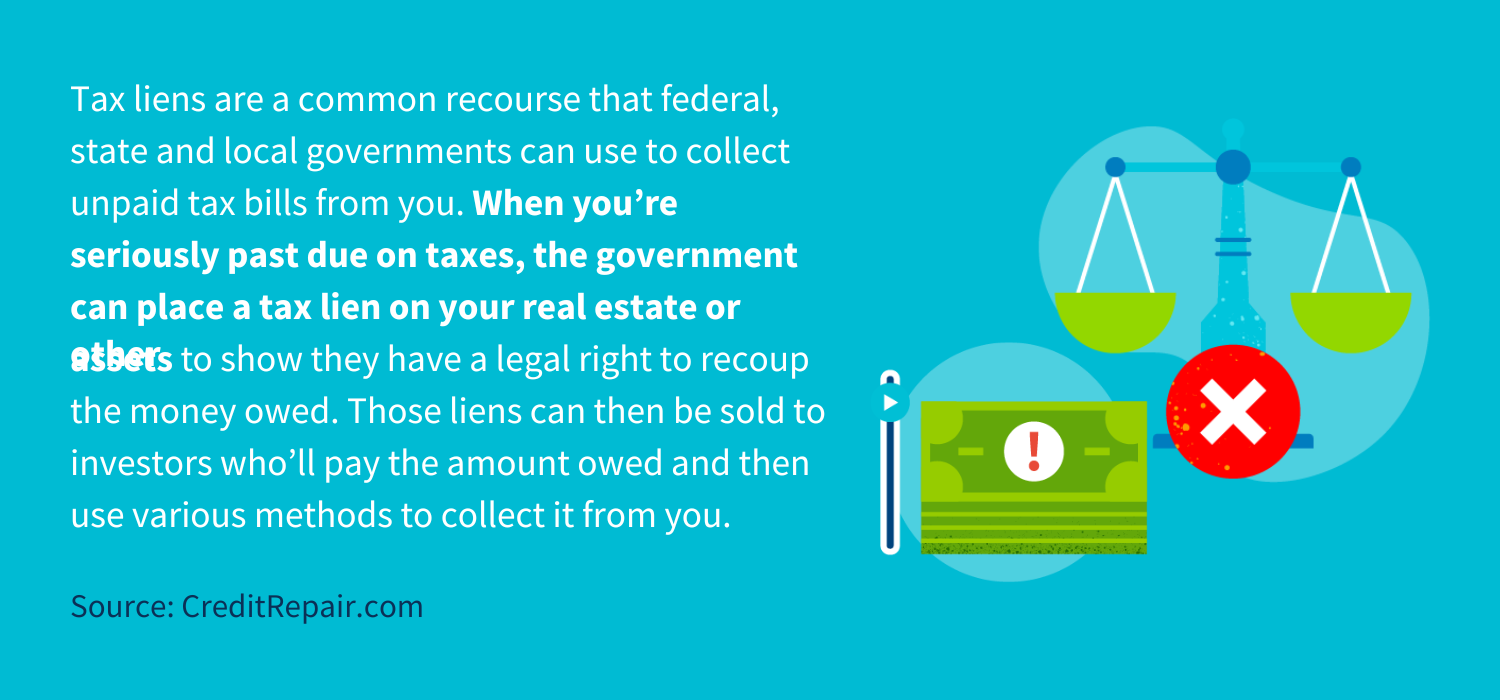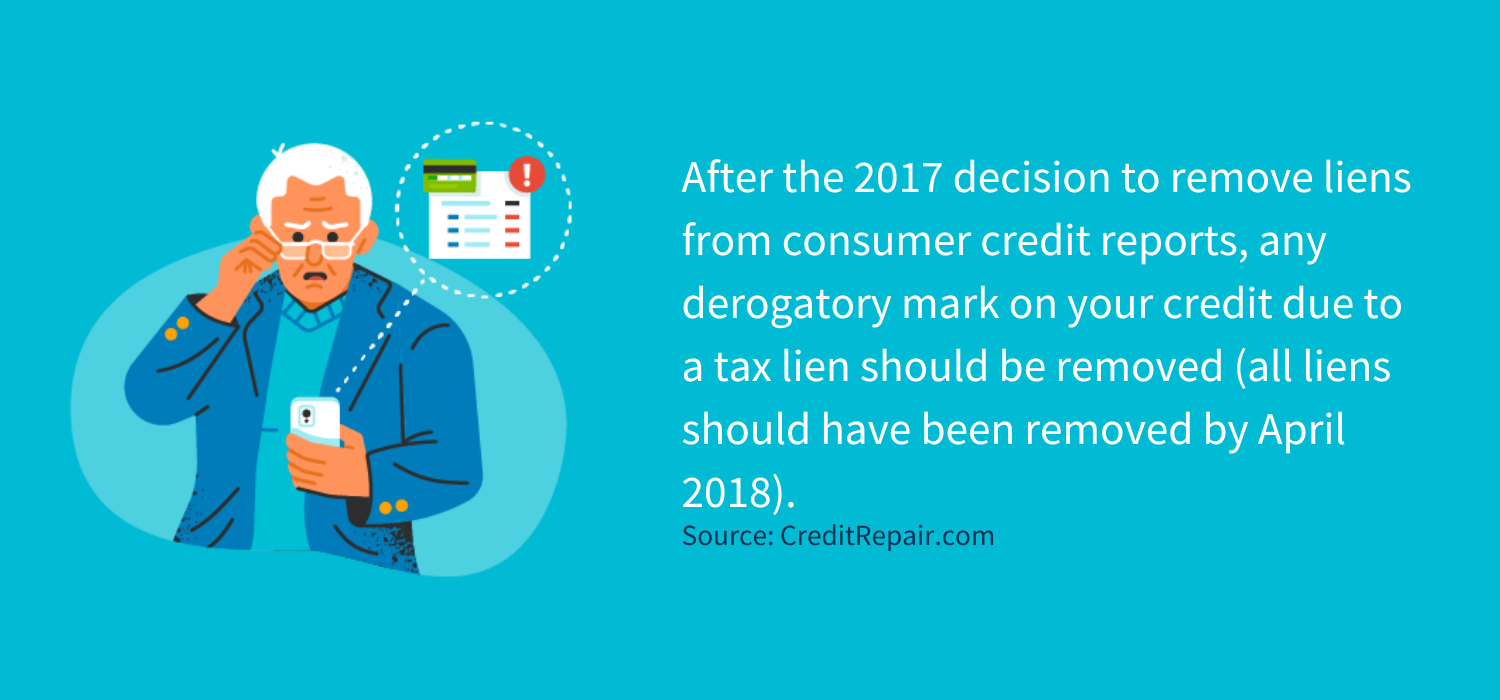

Disclosure regarding our editorial content requirements. If you're worried about how a tax lien on your credit report will affect your credit , there's great news. Since 2018, all tax liens were removed from consumer credit reports by the three significant reporting agencies, Equifax ®, Experian ® and TransUnion ®. These brand-new requirements became part of a push to make sure the accuracy of credit reports and make accessing credit details much easier for customers.
What are tax liens?

Tax liens are a typical option that federal, state and city governments can use to gather unpaid tax bills from you. When you're seriously overdue on taxes, the government can put a tax lien on your realty or other assets to reveal they have a legal right to recoup the money owed. Those liens can then be sold to financiers who'll pay the amount owed and then use
different approaches to collect it from you. How do tax liens affect your credit
? The short answer is that they don't: tax liens are not included on credit reports.
According to the Consumer Financial Defense Bureau, the three significant credit bureaus began eliminating tax liens and civil judgments from credit reports in July 2017 as part of the National Consumer Assistance Strategy (NCAP).
Due to the modifications brought about by the NCAP, property liens or tax liens are no longer included on your credit report and should have no result on your credit report.
Nevertheless, If the lien stays unpaid, you might receive a tax levy in which your wages can be garnished or bank accounts and other properties took. This is a various scenario and may seriously affect your creditworthiness.
So how will the removal of tax liens from your credit report affect your credit report!.?.!? According to the Wall Street Journal, the more than 5.5 million liens that have been eliminated from consumer credit reports because the settlement have increased the loan approval odds for numerous Americans.
What public records can be on your credit report?
Due to the removal of civil judgments and liens, the only public records shown on your credit report now are personal bankruptcies. This is specifically advantageous if the only negative marks on your credit report were due to a tax lien or civil judgment. Lenders will no longer have access to this individual info, and their choices won't be based upon any government liens versus you.
However, because personal bankruptcy can remain on your credit report for as much as 10 years, it will still lead to a substantially lower credit history, even if your tax liens are no longer listed. That's why credit repair work programs are a better choice than personal bankruptcy, since lenders will see that you are making strides in paying for your debt rather of canceling it.
What to do if a tax lien is on your credit report

After the 2017 decision to get rid of liens from customer credit reports, any derogatory mark on your credit due to a tax lien should be removed (all liens should have been removed by April 2018). The quicker this takes place, the much better
off you'll be, specifically if you're in the procedure of requesting a cars and truck loan, home loan or other significant investment. This is why it is necessary to monitor your credit and file a dispute with the credit bureau if a tax lien on a credit report is listed. Since such disagreements often spend some time to make any obvious change to your overall credit rating, getting this part done early is essential if you prepare to apply for credit in the future.
In a lot of cases, submitting a disagreement is a pain-free process and can have an effect on your credit history. Depending on the quantity you owe, you might see your credit score raised through the easy task of contesting a tax lien that should not be appearing in the very first location.
Bear in mind that people with tax liens frequently have other monetary obstacles too, so how much your rating might improve will be more of a function of other items, like payment history and credit usage.
How to examine your credit report and appropriate mistakes
As laws continue to require transparency and make it simpler for consumers to monitor their credit, there are several ways to correct errors that could be reducing your rating.
The initial step to doing this is to get your credit report from all 3 credit bureaus. You can access all 3 reports from AnnualCreditReport.com or get info about how to ask for a totally free credit report once a year on the USA.gov website.
Lots of charge card companies and banks now likewise include free credit tracking services, which include access to all your credit reports.
Monitoring your credit regularly will assist you in several ways:
- You'll be warned of anybody trying to steal your identity or utilize your name for fraudulent credit card transactions and loans.
- You'll see any tough queries made using your name and Social Security number.You'll have
- a better snapshot of your monetary health to concentrate on both little and big steps that can be taken to make it much better. You'll see what possible lenders see, including your payment history and the balances of your charge account and loans.Besides being a
- smart monetary move, staying up to date with what's on your credit report will make sure you're concentrated on raising your credit score and fixing what can be fixed. You can also work with the consultants at CreditRepair.com
to get your credit history and learn ways to pay for your financial obligations and set a better course for your future monetary path. We can assist challenge and challenge inaccurate negative marks on your credit, consisting of any tax liens on a credit report that should not be there. We likewise supply customized education on how to maintain a strong credit report with time, lower rates of interest you
‘re already paying and become debt-free to accomplish greater monetary success. Note: The info provided on CreditRepair.com does not, and is not planned to, act as legal, monetary or credit
guidance ; rather, it is for basic informational functions just. Written by Paul Dughi Paul Dughi has actually been with enterprise companies for more than 20 years and has an MBA in Company Administration. He is the Founder and Chief Strategist at StrongerContent.com.View all posts by Paul Dughi Discover how it works Source




